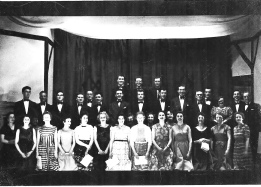
Sing in Harmony









Pilkington Choir - Early Days
The “Choral Section” originated early in 1956, when an enthusiastic group of men from Pilkington Glass Home Sales and other departments, assembled to rehearse Four Part-songs, as a Male Voice Choir, essentially for their own entertainment. Rehearsals were held in an upstairs room at the “Running Horses” public house. One of the town's most eminent musicians, Mr Joseph Leigh, acted as the Conductor.
First mention of the group appeared in the “Cullet” (Pilkington's House magazine) of June 1956 that “men choristers were required”. Their aim was to give concerts for the benefit of charities and similar organisations.

However, with so much competition from a large number of other Male Voice Choirs in the town, the response was poor, so in 1957, the decision was made to widen membership to to ladies in order to form a Mixed Voice Choir. A room for rehearsals was booked at the YMCA and whilst the number of members was a little disappointing, they were very enthusiastic. Music was purchased and rehearsals continued throughout the summer. By the autumn, the choir had improved sufficiently to perform in public and they took on concerts at the local hospitals and Pensioners’ Clubs.
In late summer of 1958, the Committee decided that the timing for rehearsals at the YMCA was inconvenient for the majority of the members but more importantly, that an hour was not long enough for a good rehearsal. Permission was granted for rehearsals to be held in the Pilkington Sheet Works canteen, where they continued until 1981, when the choir moved to the Pilkington Pensioners’ Clubhouse in Ruskin Drive
In 1969, the choir recorded and broadcasted, six hymns for the BBC programme, “In Every Corner Sing”. In 1971, they took part in a “Festival of Choirs” at Queen's Hall, Wigan, together with other choirs from Crewe and Manchester.This inspired the Choir to host a similar Festival in 1972, in aid of the Mayor's Appeal for the then Providence Hospital in St Helens.
The Choir has been led by just seven conductors in its life. Joe Leigh was its first conductor; followed by Wilf Jones; Osborne Hancock; Harry Corns; Albert Johnson; David Aldred and since 1993, by Anne O'Hara.
In late summer of 1958, the Committee decided that the timing for rehearsals at the YMCA was inconvenient for the majority of the members but more importantly, that an hour was not long enough for a good rehearsal. Permission was granted for rehearsals to be held in the Pilkington Sheet Works canteen, where they continued until 1981, when the choir moved to the Pilkington Pensioners’ Clubhouse in Ruskin Drive
In 1969, the choir recorded and broadcasted, six hymns for the BBC programme, “In Every Corner Sing”. In 1971, they took part in a “Festival of Choirs” at Queen's Hall, Wigan, together with other choirs from Crewe and Manchester.This inspired the Choir to host a similar Festival in 1972, in aid of the Mayor's Appeal for the then Providence Hospital in St Helens.
The Choir has been led by just seven conductors in its life. Joe Leigh was its first conductor; followed by Wilf Jones; Osborne Hancock; Harry Corns; Albert Johnson; David Aldred and since 1993, by Anne O'Hara.
| Home |
| About Us |
| History |
| Book Us |
| Repertoire |
| Members |
| Friends |
| Join Us |
| Contact Us |
| Accompanist |
| Musical Director |
| Accompanist |
| Musical Director |
| Home |
| About Us |
| History |
| Book Us |
| Repertoire |
| Members |
| Friends |
| Join Us |
| Contact Us |
| Accompanist |
| Musical Director |